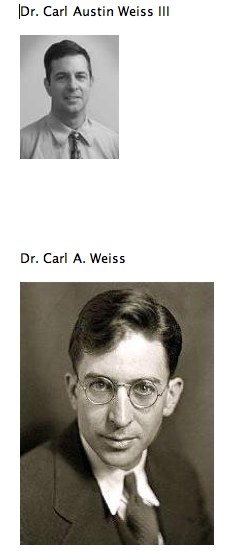|
|
Dr. Carl Weiss faces a daunting task. He is trying to extricate his grandfather's name from its ominous place in history as the assassin of Senator Huey Long. A recent film called 61 Bullets, outlines Weiss' father's work:
Moments after the shooting in the Louisiana State Capitol stopped, Huey Long's assailant, Dr. Carl Weiss, was riddled with 60 bullets. Louisiana Senator Huey Long was dead 30 hours later. It was 1935. Dr. Weiss' son, Carl Weiss Jr., was 3 months old. Now, so many years later, Weiss Jr. is on a mission to recover a bullet (the 61st) from Huey Long's buried body, overturn history and clear his family's name before it's too late. How does a son try to love a father he never had? How does a family find closure over the stigma of an assassination? How is history written? Will the Weiss family have the chance to change it? And who killed Huey Long?
The following information
referred to in the interview with Dr. Weiss may be found in the book listed below entitled, My Wars written by former State
Police Superintendent Francis Grevemberg. The entire paragraph below (with links) has been taken word for word from a blurb
related to that source: "My Wars also describes a ride into
north Louisiana, in which eyewitness state troopers at the scene of the shooting of Huey Long in 1935 informed Grevemberg
that Dr. Carl Weiss (1906-1935) was not armed and that Long was in fact shot to death by his own bodyguards. Grevemberg
signed an affidavit to this effect with attorney and publisher Thomas Angers. Grevemberg related how the shooting of Long
came up during a conversation among four troopers accompanying Grevemberg on a casino raid. Grevemberg said that the troopers
told how Weiss' gun had been taken from his car after the shooting. "It appears. . . that all of the actions following
the shooting were a conspiracy to cover up the accidental death of Senator Long and the killing of Dr. Weiss," said Grevemberg.
The troopers told Grevemberg that what started out as a fist to Long's lip by Dr. Weiss triggered an accidental shooting that
ended in a hail of gunfire. Weiss was a son-in-law of a south Louisiana district judge Benjamin Pavy of Opelousas, the
seat of St. Landry Parish,whom Long had gerrymandered out of his position." Dr. Carl Weiss III and Mr. Rapaport Filmmaker Ken Burns'
incredible film on Huey Long ends with a section in which Betty Carter, wife of journalist Hodding Carter, a staunch opponent
of Huey Long, discusses the climate surrounding the assassination of Long. Journalist Izzy Stone, not known for pronouncements
of violence, also makes a very unusual statement in this clip. This clip is a series of stills, not the film itself, but listen
carefully to the audio. The title of the section is Every Man A King.
|
|||||||||||||||

